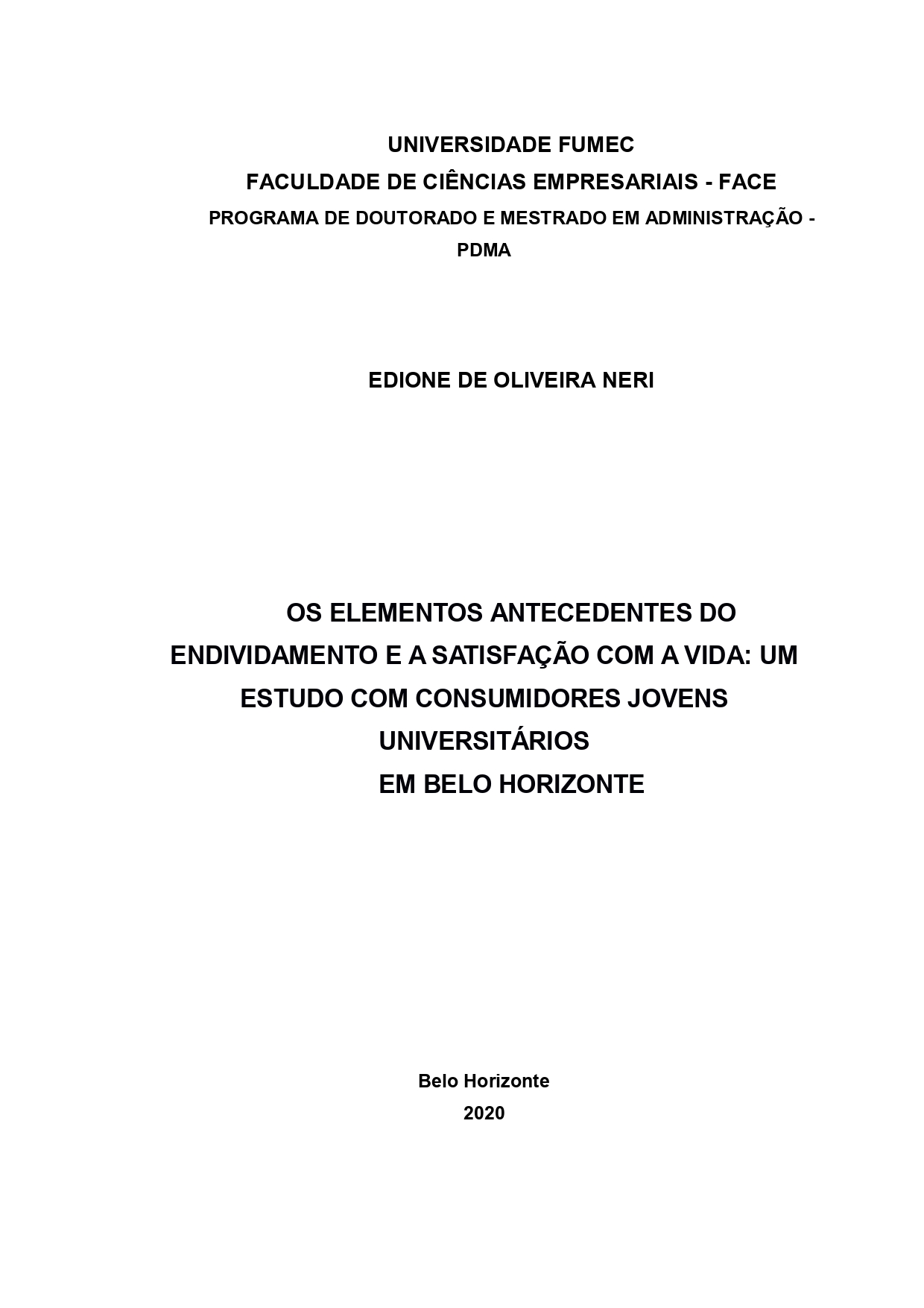Os elementos antecedentes do endividamento e a satisfação com a vida: um estudo com consumidores jovens universitários em Belo Horizonte

Visualizar/
Data
2020Autor
Neri, Edione de Oliveira
xmlui.mirage2.itemSummaryView.MetaData
Mostrar registro completoResumo
Compreender o comportamento do consumidor nesse cenário faz-se necessário a
fim de analisar o endividamento dos consumidores, as influências de elementos
individuais que se apresentam como preditores do endividamento, e analisar o
impacto da dívida pessoal na satisfação com a vida, no atual momento do país.
Nessa perspectiva, ao observar o comportamento do consumidor na busca por
compreensão e para a análise do endividamento dos consumidores, fez-se
necessário analisar os elementos individuais (hedonismo, teoria do comportamento
planejado, impulsividade, fatores financeiros e materialismo) que se apresentam, em
vários estudos aqui explicitados, como antecedentes ao endividamento. E também
verificar o possível impacto do endividamento na satisfação com a vida dos jovens
universitários brasileiros, o que pode contribuir para o conhecimento acadêmico
nessa área. O objetivo principal da pesquisa foi mensurar o percentual máximo de
variação no endividamento e na satisfação dos respondentes, que é gerado pela
variação dos construtos antecedentes. Para tanto, realizaram-se estudos
bibliográficos dos construtos investigados, foi criado um modelo hipotético e foi
realizada uma pesquisa quantitativa por meio da aplicação de 340 questionários.
Pôde-se concluir com a pesquisa que o nível de conhecimento e as habilidades
financeiras têm impacto negativo sobre o potencial de endividamento de uma
pessoa e influenciam também sua atitude em relação ao crédito, levando ao uso
mais consciente das dívidas mais altas e de longo prazo. Também se conclui que o
nível de preocupação diante das dívidas impacta o nível de satisfação com a própria
vida. Esta pesquisa aprofunda os conhecimentos sobre as inter-relações entre a
dívida, a satisfação e os antecedentes da dívida, principalmente em um momento de
incerteza econômica, pois estudos mostram que tempos de crise geralmente
resultam em grandes transformações na sociedade. Na medida em que o
comportamento do consumidor também sofre mudanças com o advento de novas
tecnologias, em um mundo cada vez mais conectado, há uma sobrecarga de
informações publicitárias incentivando o aumento do consumo dos indivíduos To the extent that consumer behavior also suffers, with the advent of new
technologies and connectivity, in an increasingly connected world, there is an
overload of advertising information encouraging an increase in the consumption of
individuals. Understanding consumer behavior in this scenario is necessary in order
to analyze consumer indebtedness, the influences of individual elements that present
themselves as predictors of indebtedness, and to analyze the impact of personal
debt on life satisfaction, at the current moment of our country. In this perspective,
when observing consumer behavior in the search for understanding and analyzing
consumer indebtedness, it was necessary to analyze the individual elements
(hedonism, theory of planned behavior, impulsivity, financial factors and materialism)
that are presented in several studies, as presented, as a background to
indebtedness. And also to identify the possible impact of the debt, in the satisfaction
with the life of the young Brazilian university students, contributing to the academic
knowledge. The main objective of the research, which is to measure the maximum
percentage of variation in the indebtedness and satisfaction of the respondents,
which is generated by the variation of the previous constructs, was achieved. For this
purpose, bibliographic studies of the constructs to be investigated were carried out, a
hypothetical model was created and a quantitative research was carried out through
the application of 340 questionnaires. The research concludes that the level of
financial knowledge and skills has a negative impact on a person's indebtedness
potential, and also influences his attitude towards credit, leading to a more conscious
use of higher and long-term debts. And that the level of concern about debts impacts
the level of satisfaction with life itself. This research deepens the knowledge about
the interrelationships between debt, satisfaction and debt history, especially at a time
of economic uncertainty, as studies show that in times of crisis, they usually result in
major transformations in society.
